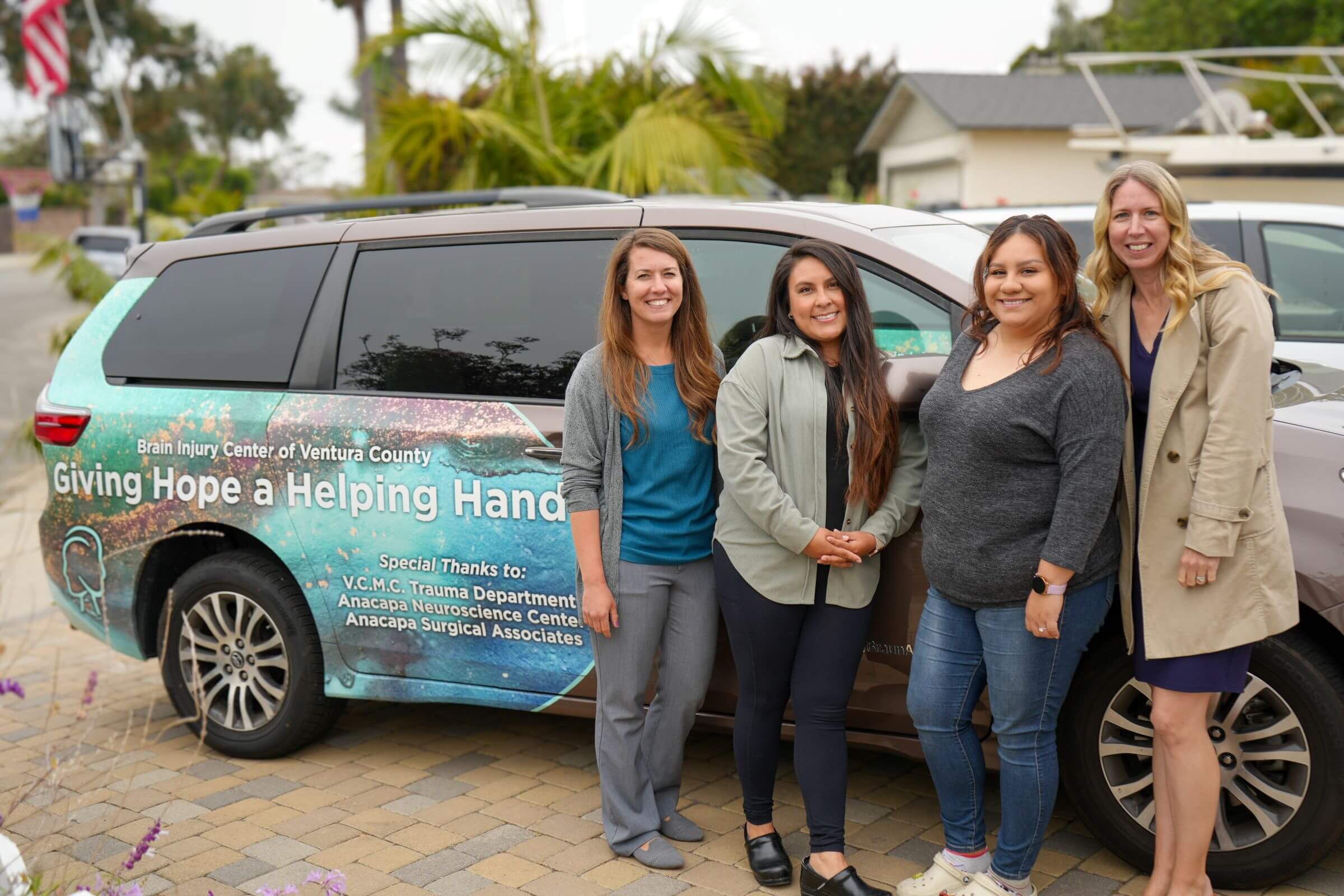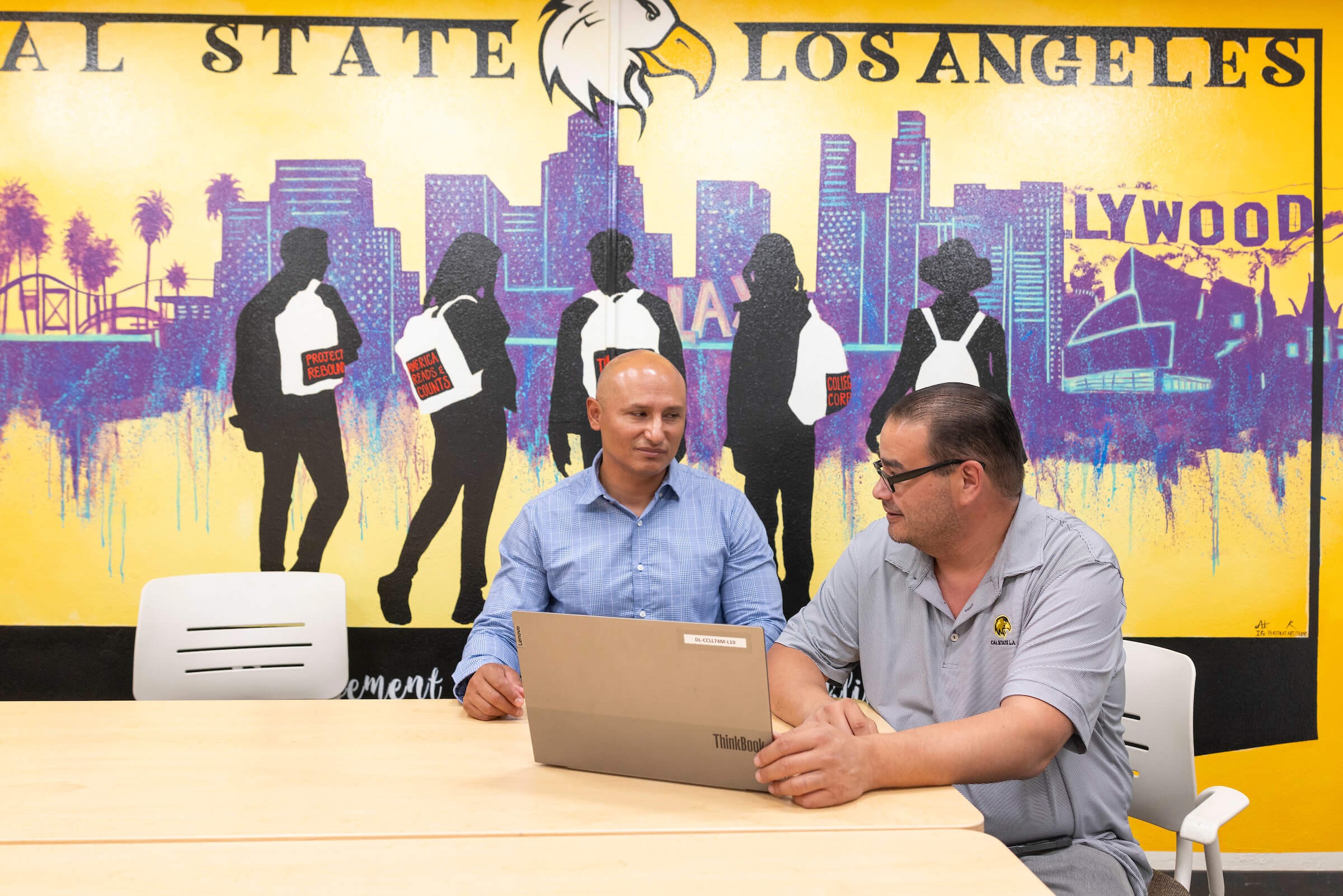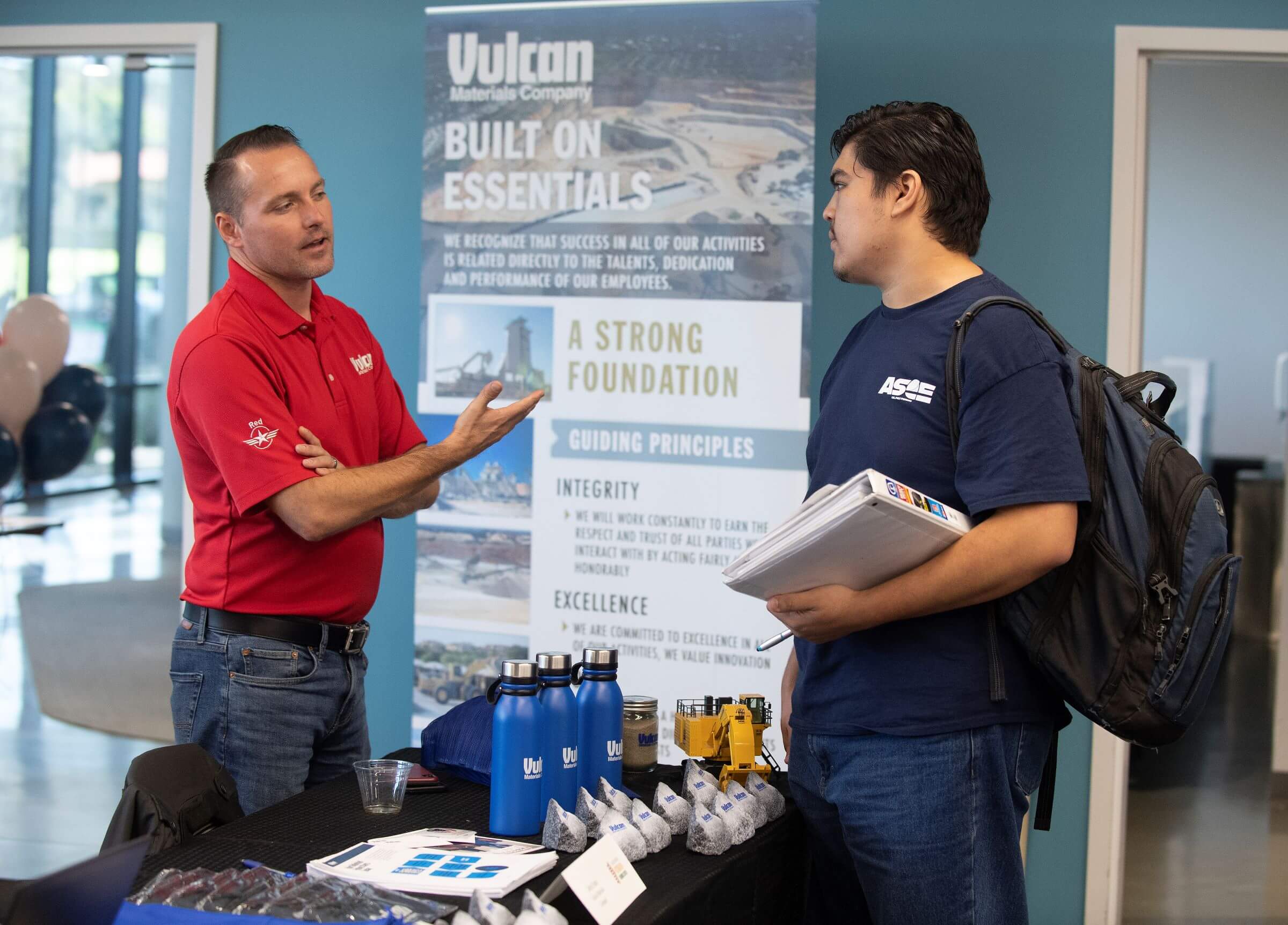As the largest four-year public university system in the U.S., the California State University is responsible for preparing thousands of individuals for future careers that will benefit both the state and the nation.
To help students launch those careers, many CSUs have developed partnerships with potential employers to provide students with hands-on learning, real-world work experience and employment opportunities. Learn about a few career pathways offered across the CSU.
Career Launch Pad for Health Sciences Students

From left: Brain Injury Center Executive Director Chrissy Stamegna, Center Program Director and CSUN alumna Lily Zepeda, Center Administrator Berenise Lemus, and Professor Kristen Linton
Over the past decade, CSU Channel Islands has grown a
partnership with the Brain Injury Center of Ventura County that has provided CSUCI students with learning and employment opportunities.
“They can work and get experience that's related to their career of interest," says Kristen Linton, CSUCI associate professor in the Health Science program. “That's important because most of our students have to work, so then they can work while they're gaining experience that will benefit them in their career."
The relationship was initiated through Linton, who developed a bilingual and bicultural intervention that was adopted by the center. She now sits on the center's board and is still involved with the center's work in a research capacity.
The center has an adult residential facility where four adults recovering from brain injuries receive 24-hour caregiving, supervision and support. The center also offers support groups and hospital-to-home support intervention for the Ventura County Medical Center, which includes transfers out of the hospital and home visits.
By working with the center, students interested in clinical health care fields—such as nursing, operational therapy, physical therapy, social work, medical doctorates and physician assistance—can get experience in areas like case management, medication management, personal caregiving and working with hospitals. The opportunity connects their classroom learning with real-world practice.
“Brain injury as a diagnosis is really diverse, so there are physical, cognitive and mental health challenges that the students are dealing with in the caregiver role," Linton says. “In the care transitions role, they're also dealing with knowledge of the whole system. … And then, they're going into the hospital for hospital visits and doing home visits."
“It's the experience that they can talk about in interviews, in their graduate school applications or in their applications to nursing, PA or social work programs."
Many students who are paid employees at the center apply their work toward the clinical hours required for licenses and credentials. Other students work for the center through CSUCI's Service Learning in Health Sciences class and earn course credits toward graduation. During the past nine years, the center has seen 20 paid student employees and 13 service-learning students from CSUCI—a significant number because the center has fewer than 30 employees at any given time.
For many, a position at the center can serve as a launching point for future careers, Linton says. For example, Lily Zepeda began working at the center as a CSUCI student to help implement Linton's intervention. She was then hired full-time after graduation and still works at the center.
Prison to Career Pathway

Cal State LA graduates Casi Amezcua and Charlie Praphatananda meet on campus for training through the Prison to Careers Equity Pathway program.
With recent funding from the U.S. Department of Justice, Cal State LA has launched the new
Prison to Careers Equity Pathway program to connect formerly incarcerated individuals with work opportunities as they reenter their communities.
Cal State LA has been offering an in-person bachelor's degree program for incarcerated students through its
Prison Graduation Initiative since 2016. Almost 40 students have earned a degree through the program, and more than half have now returned home. But finding a job that leverages the degree has proven challenging for many.
“This program is about helping our graduates leverage their lived experience along with their academic achievements, not to get jobs, but to have careers where they have meaningful opportunities to contribute to our economy and to contribute to their own family," says Taffany Lim, executive director of CSULA's Center for Engagement, Service, and the Public Good. “Most of our students will tell you that they have a strong desire to give back and help repair their communities."
The Cal State LA team is working with the Career Center and the nonprofit New Ways to Work, as well as developing partnerships with about 15 mission-oriented organizations as potential employers, to connect graduates with paid work experience that will expose them to career opportunities. The hope is to give participants an opportunity to work in a range of areas beyond service roles, such as web design, client relations and case work.
But because this will be the first time many of the graduates have worked in an office environment, the pathways program is providing training on both sides. First, it will prepare employers for working with these graduates and providing the support and mentorship that formerly incarcerated students need.
Participating graduates receive career coaching, mentoring, technology training, guidance in maneuvering the workplace, resume building support and interview preparation.
Currently, three graduates are in the training stage of the program and preparing for the interviewing process. They plan to begin their positions at partner organizations in January 2025.
“Participating in the pathways program has been an incredible experience," says Charlie Praphatananda, '20, Communication Studies. “I have been able to focus more on what I want to really do with my life as far as a career is concerned, and the technology part is a bonus as I get the opportunity to increase my skill set. Just an amazing experience."
Casi Amezcua, '24, Organizational Communication, adds: “Educating the incarcerated is vital not only to reduce recidivism, but to educate, empower and fill the prisoner with optimism, opening a world of possibilities."
Road to Public Service
To help students enter careers in public service,
Fresno State has joined the
Pathways to Public Service Program (PTPS), from the U.S. Department of Health and Human Services' Office of the National Coordinator for Health Information Technology.
Established in 2019, the program provides students at participating universities with access to virtual career fairs, professional development workshops on topics like navigating the USA Jobs website and crafting a resume, information on the federal hiring process, networking opportunities with federal hiring officials and internships specific to the pathways program. Students who complete an internship and meet the necessary requirements become eligible for permanent employment at the department's partnering agencies.
“It creates a clear pipeline for students [to launch a career in government], if that's what they want to do, and then educates them because they're under the impression that the government requires you to be in political science or something similar to get a job," says Mary Willis, executive director of Fresno State's Career Development Center.
These opportunities help expose students to the breadth of roles available within the federal government, including research and engineering positions.
“A huge problem for students is career awareness," Willis says. “Having students become aware of what's available to them sets them up for a long-term career with the federal government, should they choose to go that direction."
CSU Dominguez Hills also recently joined the program to benefit its students. “Having PTPS at CSUDH is a tremendous opportunity for our students to start building their careers in public service," said
Brenda Mendez, CSUDH director of career development. “These types of partnerships not only prepare students to enter the workforce, but also provide the public sector with a pipeline of talented, hardworking individuals."
Career Support for Student Veterans

Sponsored by Cal Poly Pomona's Veterans Resource Center, the Future Forward career fair allows military-affiliated students to network and learn about opportunities post-graduation.
For student veterans at Cal Poly Pomona, the
Veterans Resource Center (VRC) has forged relationships, developed resources and worked closely with the Career Center to help them find a career path post-graduation.
First, the VRC sponsors the Future Forward event, a career fair for military-affiliated students. It focuses on education, employment opportunities, veterans' resources and business entrepreneurship—allowing students to network with potential employers. It also features military officer programs and graduate school programs.
“We're trying to [showcase] the different pathways that students can take after they graduate, like graduate school or creating their own business, in addition to having students network with the employers and resource partners," VRC Director Elke Azpeitia says.
The VRC also offers industry site visits at companies like Raytheon, Northrop Grumman, Lockheed Martin and the Pomona Courthouse. Students are able to meet with hiring managers, see the various jobs available and learn about current projects. Students who participate in a tour can sometimes have their applications prioritized for review. In fact, after a
2019 site visit to Raytheon,14 student veterans received internships or jobs with the company.
Finally, the VRC highlights campus partnerships with employers that prioritize hiring veterans, such as the U.S. Department of Health and Human Services and the U.S. Department of Agriculture. In addition to participating in CPP career fairs and offering internships, hiring managers and CPP alumni from these partners will come to campus to network with students. The VRC will often host these individuals and invite students to network.
“It's important for the student veterans to feel like they have that support," Azpeitia says. “It gives them confidence. Having a support network is a game changer."
Learn about other ways the CSU is helping graduates successfully transition from college to career.